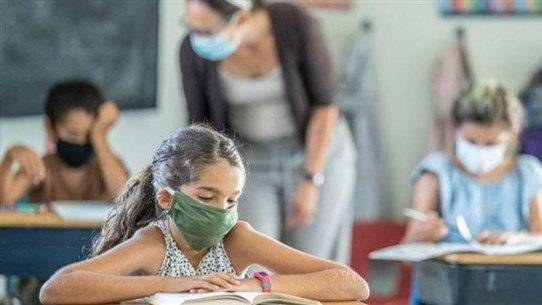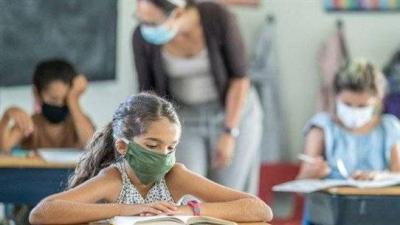Unjustified, exorbitant increases in fees for private schools for the 2022-2023 academic year have emerged, part of which is in Lebanese pounds, supplemented by fees in cash dollars to support the school's fund. This may seem reasonable since the prices of all goods in Lebanon have become tied to the dollar, but the chaos and randomness in the sector are unacceptable. What is the fate of parents who cannot secure these dollars?
As with everything in the country, education in private schools has become a luxury only the wealthy can afford. It seems the cries of parents will be loud this time, as some schools have started sending fee costs to students' families. For instance, Saint Joseph School in Ain Tura requested $450 per student, $400 for families with two children enrolled, and $350 if the family has three children, in addition to an amount in Lebanese pounds ranging between 24,800,000 and 25,200,000 Lebanese pounds depending on the educational stage. Similarly, Mont La Salle school had fees ranging from $200 to $300 plus amounts in Lebanese pounds between 12,500,000 and 19,500,000. The Saint Famille-Fanar school imposed a fee between $575 and $750, divided by educational stage, along with a sum in Lebanese pounds with necessary discounts on the dollar based on the number of children in each family.
### Between Parents and Teachers
Lawyer Maya Jaara, the legal advisor for the Federation of Parent Committees in Private Schools, clarified that “according to Law 515/96, increases should not be determined at this time, as the schools’ budgets are supposed to be submitted at the end of January or the beginning of February. However today, exceptionally, some schools are trying to anticipate the fate of the fees for the upcoming school year so that parents can make appropriate decisions, as well as regarding teachers. After the Minister of Education issued a circular permitting private schools to price in a currency other than the Lebanese pound, fee variations between schools have increased substantially. Schools attended by students from families with low purchasing power will have fees ranging from $50 to $150 (fresh), while larger schools charge between $400 to $1000 (fresh). Currently, about 70% of students in Lebanon attend private schools, while 80% of the Lebanese population lives below the poverty line. These figures indicate that a significant number of parents are suffering and their struggles will increase next year; they cannot absorb these increases alone."
As for the salaries to be paid to teachers, they are expected to receive 15 to 20 percent of their salaries in fresh dollars, roughly equivalent to $300 for average salaries estimated at 2 million Lebanese pounds, with the rest paid in Lebanese pounds.
### Regarding the Budget
Article 2 of Law 515/96 governs school budgets in private schools, determining the maximum ratios for operational expenses (35%) and minimum ratios for wages and salaries and their supplements (65%), specifying expense and revenue categories, and distributing them across the total number of students to form the tuition fee. In the 2021-2022 academic year, operational expenses were paid at 30% in fresh dollars and 70% in Lebanese pounds. There is now a substantial disparity, as the value of that 30% has become greater than the value of the 70%. Jaara states, “For the budget of the upcoming academic year, we are unlikely to see this discrepancy as teacher salaries will rise, and we will recalculate based on 35 and 65 percent. However, the issue remains the increase in tuition fees that some families cannot bear, which is why we emphasize today that assistance should come from outside the school’s scope.”
### Proposed Solutions
Jaara confirmed that “there are several proposed solutions that could alleviate the burden of rising fees on parents and thus distribute responsibilities fairly without placing them on a single party:
1. **Activating the Role of Educational Arbitration Councils**: These serve as a court to resolve disputes between the parent committee and the school administration, regulating matters and resolving any conflict over fees if challenged by the parent committee, and auditing school accounts and budgets. However, these councils have been inactive since 2017, as successive education ministries have not formed them. The role of these councils has become crucial as it promotes transparency in budgets.
2. **Providing student dollars from the Central Bank for both residents and students studying abroad**: This involves facilitating the money transfer process from parents' accounts to school accounts and adopting fresh student dollars, which simplifies school administrations' salary payments and operational expenses. Education is a core right for students and should prioritize the education sector, fulfilling its responsibilities as it is crucial for social stability.
3. **Supporting private schools through an educational card**: Lebanon receives external aid earmarked for educational cards, but all of it goes to public schools to support them financially without leading to any improvement in their quality.
What happens to those who do not possess dollars? Are they deprived of education? Or do they turn to already struggling public schools? Education is not a luxury we can forgo during tough times; it is fundamental to sustainable development and a key element in liberating individuals from poverty, hunger, and unemployment.




